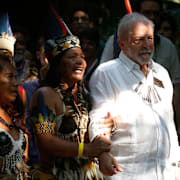
Lula da Silva during a ceremony with one of the indigenous peoples of the Amazon last year. Edmar Barros / AP
The global challenges
Brazil to host COP30: "Will delight the world"
Brazil is hosting the COP30 climate summit in November 2025, Reuters reports. The UN meeting will be held in the northern city of Belem in the state of Para, located in the Amazon.
- I am convinced that it will be a very good event and that the people of Para will make the world happy, says President Lula da Silva.

Boy in the Amazon. Uesley Marcelino/REUTERS
Climate threatGlobal challenges
"Can Lula sacrifice the Amazon for the green transition?"
As the green energy transition gears up, an inconvenient fact is exposed – climate policy and environmental protection are often at odds with each other. That's what Mac Margolis writes in an analysis in Foreign Policy. Brazil is one of the most obvious examples of this.
The country is sitting on a significant share of the metals and minerals required to produce renewable energy such as solar and wind power, including 16 percent of the known reserves of rare earth metals.
But the vast majority of mineral deposits still lie untouched in the ground, beneath the Amazon. As demand increases and big money can be made, Brazil will be faced with a dilemma:
How to excavate and transport the valuable assets without destroying forests, harming biodiversity and harming indigenous peoples?
The change of power in Brazil has given hope for better protection of the vital rainforest. But President Lula da Silva's great focus on foreign policy and his many trips abroad have delayed decision-making on important issues at home, writes Reuters' Lisandra Paraguassu.

Antarctica. / ASSOCIATED PRESS / TT
The alarm: "Waterfall" under the surface of Antarctica is slowing down
The world's largest waterfall, found beneath the surface of Antarctica, is slowing down faster than expected. That's what three researchers write in The Conversation. The current consists of several thousand billion tons of water that flows into the depths of the world's oceans and distributes heat and carbon dioxide over the world.
When the ocean current slows down, it could have major consequences for the world's climate, sea water levels and marine life, according to the researchers.
Even the oxygen levels deep in the oceans are affected by the change.
According to measurements, the current is estimated to have slowed down by 30 percent, which is a significantly faster change than previous forecasts.
Inga kommentarer:
Skicka en kommentar